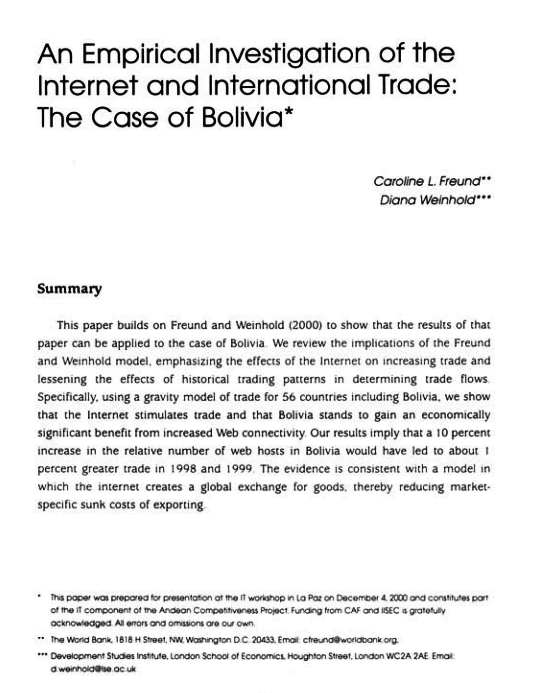An Empirical Investigation of the Internet and International Trade: The case of Bolivia
DOI:
https://doi.org/10.35319/lajed.20042319Keywords:
Internet, international trade, BoliviaAbstract
This paper builds on Freund and Weinhold (2000) to show that the results of that paper can be applied to the case of Bolivia. We review the implications of the Freund and Weinhold model, emphasizing the effects of the Internet on increasing trade and lessening the effects of historical trading patterns in determining trade flows. Specifically, using a gravity model of trade for 56 countries including Bolivia, we show that the Internet stimulates trade and that Bolivia stands to gain an economically significant benefit from increased Web connectivity. Our results imply that a 10 percent increase in the relative number of web hosts in Bolivia would have led to about 1 percent greater trade in 1998 and 1999. The evidence is consistent with a model in which the internet creates a global exchange for goods, thereby reducing market-specific sunk costs of exporting.
Downloads
References
Baldwin, Richard (1988) “Hysteresis in Import Prices: the Beachhead Effect,'' American Economic Review, 78, 773-785.
Brander, J. and P. Krugman (1983) “A 'Reciprocal Dumping' Model of International Trade,'' Journal of International Economics 15, 313-323.
Deardorff, Alan V. (1998) “Determinants of Bilateral Trade: Does Gravity Work in a Neoclassical World?” In J. Frankel Ed. The Regionalization of the World Economy, (Chicago: University of Chicago Press).
Internet Software Consortium (http://www.isc.org/)
Eichengreen, B. and D. Irwin (1998) "``The Role of History in Bilateral Trade flows'' In J. Frankel Ed. The Regionalization of the World Economy, (Chicago: University of Chicago Press).
Fitzpatrick, Gary L. and Marilyn J. Modlin (1986) Direct-Line Distances (International Edition), The Scarecow Press, Inc. Metuchen, N.J., and London.
Frankel, Jeffrey, E. Stein and S. J. Wei (1995) “Trade blocks and the Americas: the natural, the Unnatural and the super-natural,” Journal of Development Economics, no.47
Freund, Caroline (2000) “Different Paths to Free Trade: The Gains from Regionalism,” Quarterly Journal of Economics, forthcoming November.
Freund, Caroline and Diana Weinhold (2000) “On the Effect of the Internet on International Trade,” draft.
Freund, Caroline and Diana Weinhold (2003) “On the Effect of the Internet on International Trade” (revised version) Forthcoming, Journal of International Economics.
Helliwell, John F. (1996) “Do national borders matter for Quebec's trade?” Canadian Journal of Economics, vol. 29 no. 3.
McCallum, John (1995) “National Borders Matter: Canada-US regional trade patterns” American Economic Review, vol.85 no.3.
Portes, Richard and Helene Rey (1999) "The determinants of cross-border equity flows," NBER Working paper # 7336.
Quah, Danny (1999) “The weightless economy in economic development” CEP Discussion Paper # 417.
Rand McNally and Co. (1994) Historical Atlas of the World, Rand McNally and Company, Chicago.
Rauch, James E. (1996) “Trade and Search: Social Capital, Sogo Shosha, and Spillovers.” NBER Working Paper #5618.
Rauch, James E. (1999) “Networks Versus Markets in International Trade.” Journal of International Economics 48, 7-35.
Rauch, James E and Trindade, Vitor (2000) "Information and Globalization: Wage Co-movements, Labor Demand Elasticity and Conventional Trade Liberalization," NBER Working Paper # 7671.
Roberts, M. and J. Tybout (1997) “The Decision to Export in Columbia: An Empirical Model of Entry with Sunk Costs,” American Economic Review, 87, 545-564.
Sanders, Matthew (2000a) “Global eCommerce Approaches to Hypergrowth,” The Forrester Brief (www.forrester.com).
Sanders, Matthew “Sizing Global Online Exports (2000b) ” The Forrester Report (www.forrester.com).
Wei, Shang-Jin (1996) “Intra-National versus International Trade: How stubborn are Nation States in Globalization?” NBER Working Paper 5331.






